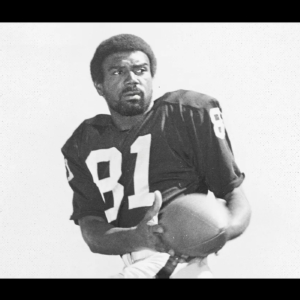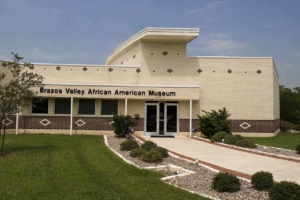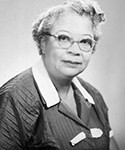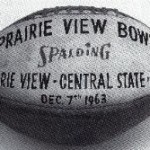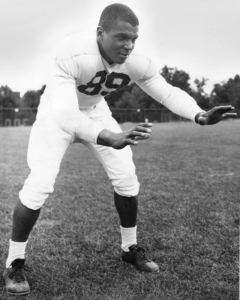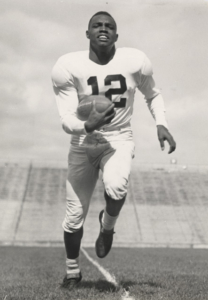Lincoln moved to end slavery on New Year’s Day 1863. It went on for three more years.
Image: The first reading of the Emancipation Proclamation before President Abraham Lincoln’s Cabinet, painted by F.B. Carpenter. (Library of Congress)
(Washington Post) On New Year’s morning of 1863, President Abraham Lincoln hosted a three-hour reception in the White House. That afternoon, Lincoln slipped into his office and — without fanfare — signed a document that changed America forever.
It was the Emancipation Proclamation, decreeing “that all persons held as slaves” within the rebellious Southern states “are, and henceforward shall be, free.”
However, the proclamation did not immediately free any of the nation’s nearly 4 million slaves. The biggest impact was that for the first time, ending slavery became a goal of the Union in the bloody civil war with the Confederacy.
The news sent shock waves throughout the divided country. Southern newspapers responded with outrage. Lincoln’s action was “the most startling political crime, the most stupid political blunder yet known in American history,” the Richmond Enquirer thundered. “The Southern people have now only to choose between victory and death.” (more)
Warren Wells, 1942-2018
Legendary Beaumont Hebert High School and Oakland Raiders All-Pro receiver passes
(San Jose Mercury News) Warren Wells streaked through (Oakland) Raiders history like a comet, the prototypical Al Davis deep threat whose career was derailed by personal demons but whose staggering talents were unforgettable to those who saw him up close.
Wells died (Dec. 27) of congestive heart failure at age 76 in his hometown of Beaumont, Texas, a story first reported by NBC Sports Bay Area.
In 1963, as a senior at Texas Southern University, Wells was named to the Pittsburgh Courier Black College All-American Team.
“When you think about the vertical game and the AFL, he was a big part of that,” Raiders owner Mark Davis said in a phone interview.
(Wells) excelled at the deep routes Al Davis loved and together with quarterback Daryle “The Mad Bomber” Lamonica, helped strike fear into opposing defenses.
He would end up catching 156 passes for 3,364 yards and 42 touchdowns with the Raiders. His 23.1 yards per catch for his career was an NFL record for years, until the criteria was changed to a minimum of 200 career receptions. (more)
Brazos Valley African American museum and Texas A&M are teaming up for a new exhibit looking at churches in the Brazos Valley.
(KBTX-TV) Watch video interview here.
TIPHC Bookshelf
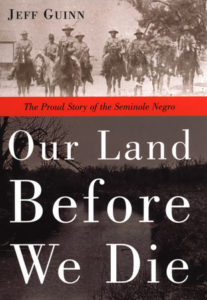 Published scholarship on black history in Texas is growing and we’d like to share with you some suggested readings, both current and past, from some of the preeminent history scholars in Texas and beyond. We invite you to take a look at our bookshelf page – including a featured selection – and check back as the list grows. A different selection will be featured each week. We welcome suggestions and reviews. This week, we offer, “Our Land Before We Die,” by Jeff Guinn.
Published scholarship on black history in Texas is growing and we’d like to share with you some suggested readings, both current and past, from some of the preeminent history scholars in Texas and beyond. We invite you to take a look at our bookshelf page – including a featured selection – and check back as the list grows. A different selection will be featured each week. We welcome suggestions and reviews. This week, we offer, “Our Land Before We Die,” by Jeff Guinn.
Winner of the 2016 TCU Texas Book Award.
In Our Land Before We Die, Jeff Guinn traces the little-known history of the runaway slaves who fled to the Florida Everglades to live alongside the Seminole Indians. Deeply rooted in tribal oral history, and based on extensive interviews with descendants, this book describes the incredible circumstances of a people who sought shelter in the shadow of a tribe whose land and welfare already hung in the balance. And yet, in their tireless journey-from Florida to Indian Territory in Oklahoma; on the seven-hundred-mile flight from persecution that took them across the Rio Grande into Mexico; and then back across the Rio Grande to Texas-they never surrendered the hope of one day attaining land of their own. Our Land Before We Die brings to life the largely forgotten history of a courageous people and the descendants for whom this story is their only legacy.
This Week in Texas Black History
Dec 30
On this day in 1900, Thelma Patten-Law was born in Huntsville. Patten-Law was the first woman physician to lead the Lone Star State Medical, Dental, and Pharmaceutical Association, an organization for black health professionals, serving in 1939-40. During her term as president, the National Medical Association (black physicians) held its annual meeting for the first time in Texas (in Houston). She was the first African-American woman to practice medicine in Houston and the first female obstetrics-gynecology specialist in the state. In 1934, she joined the medical staff at the Maternal Health Center in Houston in the Third Ward. The center would become the organization Planned Parenthood of Houston and Southeast Texas.
Jan. 1
On this day in 1929 the first black college football bowl game was played. The Prairie View Bowl was played at Houston’s West End Park, located in the Freedman’s Town area of Fourth Ward. With the exception of four games, the bowl game was played annually until 1963 on Jan. 1. In the inaugural game, Prairie View, coached by J.F. Law, lost to Atlanta (Ga.) University, 7-0, before a crowd of 7,000 fans.
Jan. 1
The 1948 Cotton Bowl football game in Dallas featured the first African Americans to participate in the game when Southern Methodist and Penn State played to a 13-13 tie. Penn State’s roster included running back Wally Triplett and wide receiver Dennie Hoggard. It was the first interracial game played at the stadium.
Jan. 1
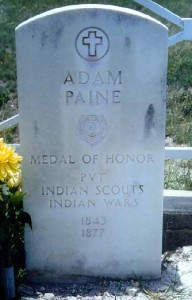 Adam (“Adan”) Paine, a Congressional Medal of Honor recipient, died on this day in 1877. Paine was a scout at Fort Duncan, Texas and received the MOH for his actions during a battle at Quitaque Peak where he defended himself and four other scouts against several bands of Comanche Indians on September 26, 1874. Thanks to his efforts during the engagement, all of the scouts survived. Paine’s commanding officer, Colonel Ranald S. Mackenzie, said that Paine “has more cool (and) daring than any scout I have ever known.”
Adam (“Adan”) Paine, a Congressional Medal of Honor recipient, died on this day in 1877. Paine was a scout at Fort Duncan, Texas and received the MOH for his actions during a battle at Quitaque Peak where he defended himself and four other scouts against several bands of Comanche Indians on September 26, 1874. Thanks to his efforts during the engagement, all of the scouts survived. Paine’s commanding officer, Colonel Ranald S. Mackenzie, said that Paine “has more cool (and) daring than any scout I have ever known.”
Jan. 3
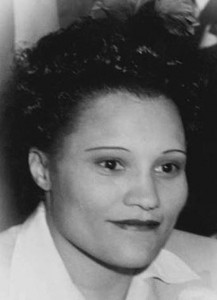 On this day in 1912, the founder of the Fatburger restaurant chain, Lovie Louise Yancey, was born in Bastrop. She moved to Los Angeles in the mid-1940s and at age 35 partnered with Charles Simpson to open their first restaurant, a three-stool hamburger stand in South Central Los Angeles in 1947. They called the business Mr. Fatburger, dropping the “Mr.” in 1952. By the end of 1985, the chain had over fifteen franchise sites throughout southern California. Noted as “The Last Great Hamburger Stand,” Fatburger now has restaurants in 29 countries, including China, Pakistan and the United Arab Emirates. Yancey established a $1.7-million endowment at the City of Hope National Medical Center in Duarte, California in 1986 for research into sickle-cell anemia as a dedication to her grandson who died of the disease. Yancey died of pneumonia on January 26, 2008, at the age of 96.
On this day in 1912, the founder of the Fatburger restaurant chain, Lovie Louise Yancey, was born in Bastrop. She moved to Los Angeles in the mid-1940s and at age 35 partnered with Charles Simpson to open their first restaurant, a three-stool hamburger stand in South Central Los Angeles in 1947. They called the business Mr. Fatburger, dropping the “Mr.” in 1952. By the end of 1985, the chain had over fifteen franchise sites throughout southern California. Noted as “The Last Great Hamburger Stand,” Fatburger now has restaurants in 29 countries, including China, Pakistan and the United Arab Emirates. Yancey established a $1.7-million endowment at the City of Hope National Medical Center in Duarte, California in 1986 for research into sickle-cell anemia as a dedication to her grandson who died of the disease. Yancey died of pneumonia on January 26, 2008, at the age of 96.
Jan. 5
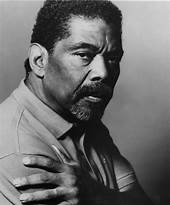 Alvin Ailey, dancer, choreographer and founder of the world famous Alvin Ailey Dance Theater was born on this day in 1931 in Rogers (Bell County). He made his Broadway debut in 1954 and in 1958 gained his first critical success for his choreography for Blues Suite, which also marked the beginning of the Alvin Ailey Dance Company. His troupe, in 1970, became the first American dance company to tour the USSR in 50 years and received a 20-minute ovation for their performance in Leningrad.
Alvin Ailey, dancer, choreographer and founder of the world famous Alvin Ailey Dance Theater was born on this day in 1931 in Rogers (Bell County). He made his Broadway debut in 1954 and in 1958 gained his first critical success for his choreography for Blues Suite, which also marked the beginning of the Alvin Ailey Dance Company. His troupe, in 1970, became the first American dance company to tour the USSR in 50 years and received a 20-minute ovation for their performance in Leningrad.
Jan. 5
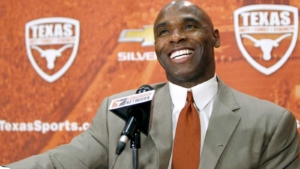 The University of Texas at Austin made a historic hire on this day in 2014 when it announced that Charlie Strong would become the school’s new head football coach, making him the program’s 29th head coach and the first African American to hold the position since UT began playing football in 1893. In fact, he also became the first black coach for any of the school’s major men’s programs. Strong, 59, signed a five-year deal paying him $5 million annually making the Batesville, Ark. native one of the highest paid coaches in the country.
The University of Texas at Austin made a historic hire on this day in 2014 when it announced that Charlie Strong would become the school’s new head football coach, making him the program’s 29th head coach and the first African American to hold the position since UT began playing football in 1893. In fact, he also became the first black coach for any of the school’s major men’s programs. Strong, 59, signed a five-year deal paying him $5 million annually making the Batesville, Ark. native one of the highest paid coaches in the country.
Blog: Ron Goodwin, Ph.D., author, PVAMU history professor
Ron Goodwin is an assistant professor of history at Prairie View A&M University. Even though he was a military “brat,” he still considers San Antonio home. Like his father and brother, Ron joined the U.S. Air Force and while enlisted received his undergraduate degree from Texas Lutheran University in Seguin, Texas. After his honorable discharge, he completed graduate degrees from Texas Southern University. Goodwin’s book, Blacks in Houston, is a pictorial history of Houston’s black community. His most recent book, Remembering the Days of Sorrow, examines the institution of slavery in Texas from the perspective of the New Deal’s Slave Narratives.
Recent Posts
Uncommon integrity
I, (NAME), do solemnly swear (or affirm) that I will support and defend the Constitution of the United States against all enemies, foreign and domestic; that I will bear true faith and allegiance to the same; and that I will obey the orders of the President of the United States and the orders of the…(more)
Democratic hypocrisy
Democracy (noun) – The belief in freedom and equality between people, or a system of government based on this belief, in which power is either held by elected representatives or directly by the people themselves. — Cambridge Dictionary Over a hundred years ago W.E.B. Dubois asked if one could be black and an American. He saw this “twoness” as perhaps the central issue affecting all Africans in America. Personally, I also feel a unique identity crisis…(more)
Submissions wanted
Historians, scholars, students, lend us your…writings. Help us produce the most comprehensive documentation ever undertaken for the African American experience in Texas. We encourage you to contribute items about people, places, events, issues, politics/legislation, sports, entertainment, religion, etc., as general entries or essays. Our documentation is wide-ranging and diverse, and you may research and write about the subject of your interest or, to start, please consult our list of suggested biographical entries and see submission guidelines. However, all topics must be approved by TIPHC editors before beginning your research/writing.
We welcome your questions or comments. Please contact Michael Hurd, Director of TIPHC, at mdhurd@pvamu.edu.

